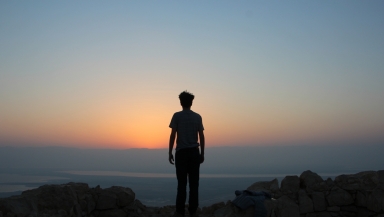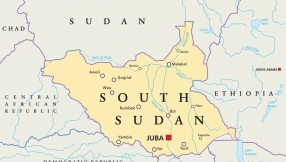
Jewish academic and Hebrew scholar Irene Lancaster reflects on the comfort that comes after affliction.
The contrast between last Shabbat's Haftorah of affliction and this Shabbat's Haftorah of comfort couldn't be greater.
From the start of chapter 40 G-d tells Isaiah to comfort His people. So G-d has now become reconciled to the Jewish people.
Meanwhile the sombre Fast day of Tisha B'Av has taken place, to be followed immediately by a lifting of spirits. The despondency caused by the destruction of the two Temples has been replaced by return from exile and the re-building of the community.
Already in the accompanying Torah reading of Va-etchanan (Deuteronomy 3:23-7:11), Moses describes the mission of the Jewish people.
Here he sets out Israel's philosophical and religious underpinnings, explaining why she has to be situated in her own land, at the crossroads of the world, placed between Europe, Africa and Asia.
No remote desert island for the tiny Jewish people; in order to do G-d's work and offer service to the world, Israel must constantly be visible, set in the eye of the storm.
For how can a small people, charged with carrying out G-d's mission to the world, remain self-contained and safe in a hermetically-sealed environment?
Israel has to be visible to the rest of the world as living proof of the existence of the One G-d.
To this end the 10 Commandments are reiterated, plus a reminder of the original Sinai experience.
G-d continues by warning against the dangers of idolatry and calls the entire heavens and earth to act as witnesses. And from Chapter 6, verse 4, Moses recites the most important prayer in the Jewish liturgy, 'Hear oh Israel, the Lord is our G-d, the One and Only'.
The Jewish people should love the One G-d with all their being, and, most importantly, teach this Torah to their children and grandchildren. Every hour of the day and night, the Jewish people should be preoccupied with Torah.
In addition, the children of Israel should never forget that they were once slaves in Egypt. The children of Israel are 'am segulah', a treasured people. They might be tiny in number, but they are great in quality, if only they remember their mission in the world.
This is not to do with natural qualities; the Jews are actually stiff-necked and stubborn. It is only through constant self-work through studying and practising Torah that the Jews will be able to establish the unique community of Israel. Only then will the Jewish people truly become a 'light unto the nations'.
Only G-d's love redeems the Jewish people daily. G-d is 'Ne'eman' (Deuteronomy 7:9) steadfast and always there for you.
This theme is reprised by the prophet Isaiah in chapter 40, our first of the seven Haftorot of Comfort, leading up to Rosh Hashana (Jewish New Year).
In words well known around the world, Isaiah promises the construction of roads through deserts; the raising of low valleys and the lowering of mountains and hills.
Everyone will recognize these activities as miracles of G-d. On the other hand, G-d is also compared to a shepherd tenderly looking after his flock (Isaiah 40:11).
And yet G-d is also the sole Creator of all. Even the greatest cultures, whether Egyptian, Assyrian, Babylonian, Persian, Greek, Roman, or those of modern times, are but a 'drop from a bucket' (verse 15) compared to the mighty Creator Who also cares for every single person. In this G-d is unique.
The One G-d simply cannot be compared to any other entity; to do so is idolatry.
G-d is not simply the ruler over the entire universe, but is also the G-d of eternity ('olam', verse 28).
Those who hope in G-d will 'go forward' and never tire (verse 31).
This last idea has been interpreted by many as referring to the draining lassitude of life in diaspora, compared to the rejuvenating, energizing effect of life in the Promised Land.
Thus begins the ascent of the seven-week period, starting from the despond of Tisha B'Av, and culminating in the crowning glory of Rosh Hashana, the first day of the Jewish New Year.













